The following diagram represents a mammalian kidney tubule (nephron) and its blood supply.
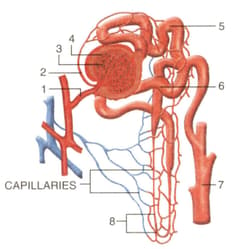
Parts indicated by the guidelines 1 to 8 are as follows :
1. Afferent arteriole from the renal artery;
2. Efferent arteriole
3. Bowman's capsule,
4. Glomerulus;
5. Proximal convoluted tubule with blood capillaries;
6. Distal convoluted tubule with blood capillaries;
7. Collecting tubule;
8. U - shaped loop of Henle.
Study the diagram and answer the questions that follow:
Which structure (normally) contains the lowest concentration of glucose?

1. Afferent arteriole from the renal artery;
2. Efferent arteriole
3. Bowman's capsule,
4. Glomerulus;
5. Proximal convoluted tubule with blood capillaries;
6. Distal convoluted tubule with blood capillaries;
7. Collecting tubule;
8. U - shaped loop of Henle.

Important Questions on The Excretory System
The following diagram represents a mammalian kidney tubule (nephron) and its blood supply.
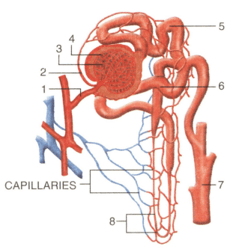
Parts indicated by the guidelines 1 to 8 are as follows :
1. Afferent arteriole from the renal artery;
2. Efferent arteriole
3. Bowman's capsule,
4. Glomerulus;
5. Proximal convoluted tubule with blood capillaries;
6. Distal convoluted tubule with blood capillaries;
7. Collecting tubule;
8. U - shaped loop of Henle.
Study the diagram and answer the questions that follow:
Where is most water reabsorbed?
The following diagram represents a mammalian kidney tubule (nephron) and its blood supply.
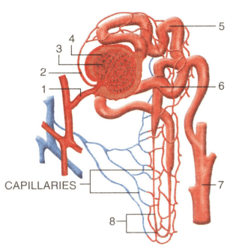
Parts indicated by the guidelines 1 to 8 are as follows :
1. Afferent arteriole from the renal artery;
2. Efferent arteriole
3. Bowman's capsule,
4. Glomerulus;
5. Proximal convoluted tubule with blood capillaries;
6. Distal convoluted tubule with blood capillaries;
7. Collecting tubule;
8. U - shaped loop of Henle.
Study the diagram and answer the questions that follow:
State the reason for the high hydrostatic pressure in the glomerulus.
The following diagram represents a mammalian kidney tubule (nephron) and its blood supply. Parts indicated by the guidelines 1 to 8 are as follows :
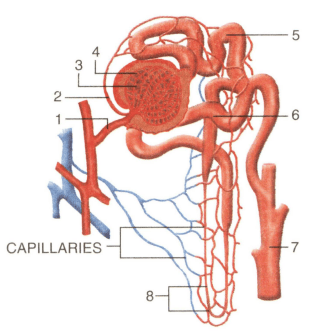
1. Afferent arteriole from the renal artery;
2. Efferent arteriole
3. Bowman's capsule,
4. Glomerulus;
5. Proximal convoluted tubule with blood capillaries;
6. Distal convoluted tubule with blood capillaries;
7. Collecting tubule;
8. U - shaped loop of Henle.
Study the diagram and answer the question that follows:
Name the part of the nephron which lies in the renal medulla.
Given alongside is a simplified diagram of the human kidney cut open longitudinally. Answer the question that follows.
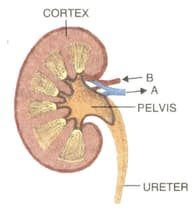
Define excretion.
Given alongside is a simplified diagram of the human kidney cut open longitudinally. Answer the questions that follow.
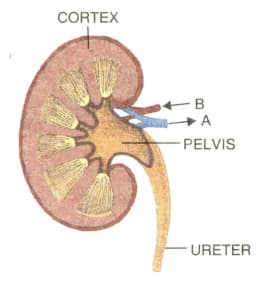
Why does the cortex of the kidney show a dotted appearance?
Given alongside is a simplified diagram of the human kidney cut open longitudinally. Answer the questions that follow.
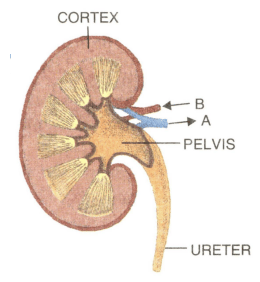
Why does the medulla of the kidney show a striped appearance?
Given alongside is a simplified diagram of the human kidney cut open longitudinally. Answer the question that follows.
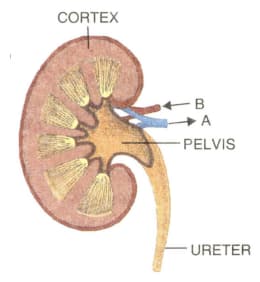
Write two differences in the composition of the blood flowing through the blood vessels 'A' and 'B'.
Study the diagram given alongside and then answer the question that follows:
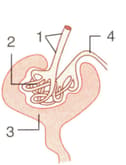
Name the region in the kidney where the above structure is present?
